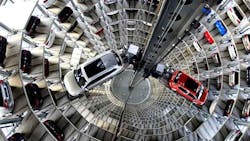Recall Plan Not a Viable Fix for Volkswagen, Says Policy Group
With Volkswagen still struggling to come up with a recall plan for an estimated 485,000 vehicles in the U.S. outfitted with emissions cheating devices, the Center for American Progress released a report today suggesting that the U.S. Environmental Protection Agency (EPA) should consider alternative penalties.
The recommendations by the Washington-based progressive policy group include up to $18 billion in fines, retrofitting public diesel fleets with cleaner technology and contributing to a fund for environmental projects to reduce vehicle pollution.
Earlier this week, Volkswagen missed a court-ordered deadline to come up with a plan to bring the defective vehicles into compliance. If VW does not come up with a plan by April 21, the emissions case could go to trial.
Todd Sax, the head of the California Air Resources Board (CARB), has said that it “may not be possible” to bring the cars up to environmental compliance and floated the idea that the cars might be allowed to stay on the road as is. CARB and the EPA must decide “what the best approach is to dealing with these vehicles” and one option may be “to accept something less than a full fix.”
According to the report, any retrofitting could involve installing an additional tank that neutralizes nitrogen oxides, which could decrease engine power and fuel economy. That would hamper the effect of the recall because some owners may choose not to retrofit their cars if it reduced performance.
The recall rate in the U.S. ranges from 55 to 75%, depending on the year. “It is reasonable to assume that this recall success rate could be even lower for defects that are not safety related,” the report states.
Here are the recommendations outlined in the report:
- Require Volkswagen to mitigate or offset the nitrogen oxide emissions attributable to its past or ongoing violations by replacing or retrofitting diesel engines in publicly operated vehicle fleets with cleaner technology. The EPA often includes mitigation actions as part of final settlements with companies regarding violations of the Clean Air Act, Clean Water Act, and other statutes.
- Assess large civil penalties for these violations in order to dissuade other carmakers from violating the law in the future. The Clean Air Act sets a maximum penalty of $37,500 for each vehicle with the illegal software. Consequently, Volkswagen could face more than $18 billion in monetary penalties.
- Work with Volkswagen to develop a significant Supplemental Environmental Project, or SEP, to clean up the U.S. transportation sector. Volkswagen would be motivated to work with the EPA to create a SEP, which could offset a portion of the civil penalties while achieving concrete pollution reductions. The SEP should direct a substantial amount of funds, perhaps calculated on a per-car basis, to create a fund for state and local governments, as well as private-sector entities, to implement projects to reduce pollution from on-road vehicles and increase deployment of zero-emission electric vehicles.
About the Author

Laura Putre
Senior Editor, IndustryWeek
As senior editor, Laura Putre works with IndustryWeek's editorial contributors and reports on leadership and the automotive industry as they relate to manufacturing. She joined IndustryWeek in 2015 as a staff writer covering workforce issues.
Prior to IndustryWeek, Laura reported on the healthcare industry and covered local news. She was the editor of the Chicago Journal and a staff writer for Cleveland Scene. Her national bylines include The Guardian, Slate, Pacific-Standard and The Root.
Laura was a National Press Foundation fellow in 2022.
Got a story idea? Reach out to Laura at [email protected]
